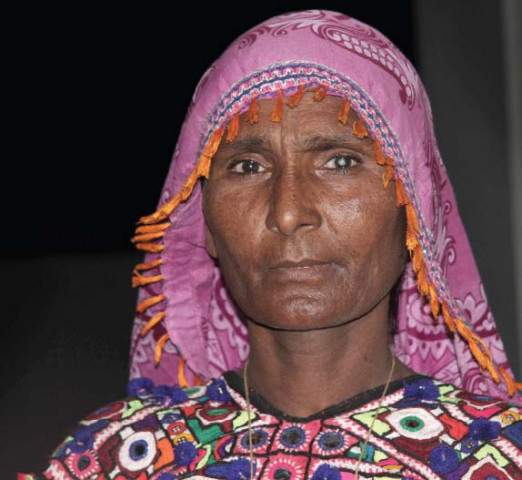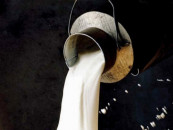Charged under the arms act, Thari teen disappears into Indian prison system
Pehlaj Bheel disappeared in 2006 and resurfaced in Jammu Central Jail.

Five years and counting - a Thari family waits for India to release their son Pehlaj.
His father, a white-haired farmer belonging to the Thar Desert’s Bheel tribe, describes the young man as mentally unstable. “His mind would start spinning, and he would be angry for awhile,” said Jummu. “He would refuse to eat, cry for no reason. Then he would become alright again.”
On May 17, 2006, Pehlaj was a loving but moody 13-year-old, attending school and nursing Bollywood ambitions in his tiny hometown of Diplo. That evening, he quarrelled with his parents and stormed out of the house. At the time, neither his father Jummu nor his mother Mula realised that it might be the last time they ever saw their son.
The couple has seven children, ranging in age from 18 to 35 years. Jummu’s daily life is an agglomeration of the hardships familiar to almost all who dwell in Tharparkar district: resources are scarce, water is precious and healthcare is primitive. Pehlaj should most likely be medicated for the seizures he experiences, but a conventional doctor was beyond Jummu’s pocket and schooling.
“We took Pehlaj to a Sufi pir. He said to give him lots of love,” Jummu said. And indeed, for the most part, Jummu and Mula claim their home life was peaceful and happy. “Our son was fond of studying, and we all used to take care of each other,” said Mula.
Initially, she and Jummu didn’t worry. As Pehlaj had stormed out with no food or water they were sure that he would be back soon. But when the night passed and he didn’t return, his family and neighbors began to search. Two days later, a khoji, or foot-tracker, discovered evidence suggesting that Pehlaj had crossed the Indian border, some 30 kilometres from his home.
Now Jummu worries constantly. For five years and two months, his son has been languishing in an Indian prison. Authorities on both sides of the border seem unable to predict when or if Pehlaj will return home.
“I have cried for so long that I have no tears left,” said Mula, hiding her face behind her pink dupatta. One of her eyes is visibly murky, a congenital condition that she thinks has been aggravated by her incessant weeping.
The Pakistan Rangers contacted the Indian border police immediately, but they denied any knowledge of the missing teenager. They repeated this claim four times over the next 15 days, at subsequent white flag meetings.
There are thousands of illegal border crossings each year. Some of them are purposeful, but many are inadvertent. Hundreds of these crossings are committed by children under the age of 18, who may end up imprisoned under hostile conditions. Both India and Pakistan intermittently release these detainees. At the end of June, India returned 11 Pakistani teens, most of who are fishermen. They had been jailed for periods ranging from four months to two years.
When human rights activists get involved, it speeds up the bureaucratic process. Ateeq, a 12-year-old from Lahore, was released in March 2010, after hopping on a train that he didn’t realise would take him across the border. He was trying to evade his father, who he feared would punish him for a day spent kite-flying. An Indian advocate discovered the boy in a juvenile prison in Hoshiarpur and, with the help of various aid groups, Ateeq was released within two months.
In October 2010, 16-year-old Nauman Arshad, also from Lahore, was released after eight months in another juvenile facility. He was subjected to prolonged interrogations where he ultimately confessed, falsely, to entering India as a suicide bomber. The truth is, Arshad had fought with his mother one morning, then taken a bus to the border instead of going to school. He crossed on foot, still dressed in his school uniform, with a pocketful of almonds and a chemistry book in hand. His release came after Human Rights International took up his case.
Pehlaj has been less fortunate. Two years after his disappearance, Indian officials finally admitted to holding the boy. India notes his arrest date as December 19, 2008, which means that for two years and seven months, there is no official record of Pehlaj’s whereabouts.
An International Red Cross worker visited Pehlaj in Amritsar Central Jail, confirming his identity and sending a letter to his family: “Dear Father, I hope everything is alright there. I wrote some letters but unfortunately, I did not get a response.”
In January 2011, the Pakistan High Commisson in New Delhi was informed that Pehlaj had been moved to Jammu Central Jail in Kashmir, which is particularly notorious for prisoner abuse. According to a 2005 Red Cross report, which became public via WikiLeaks, detainees at Jammu have undergone electric shocks, extreme stretching, suspension from the ceiling, crushing, water torture and sexual assault.
Detainees suspected of being militants are routinely killed. The report was taken from 177 prison visits and 1,491 detainee interviews, the majority of which were obtained privately. Eight hundred and fifty-two inmates from Jammu and other Kashmiri prisons reported mistreatment. The report has been disputed by India’s ministry of external affairs.
While firsthand inmate accounts place conditions as somewhat better in Pakistani prisons, there is still cause for alarm. In 1999, Human Rights Watch reported that Pakistani prisoners, including children, are routinely hung upside down, beaten with straps and subjected to other forms of torture.
“Jails are bad enough as is,” said Fawad Sherwani, a representative of the Pakistan High Commission. “If there is animosity between countries, harsh treatment is inevitable unless the jails are well monitored.”
According to Sherwani, there are currently 646 Pakistanis in Indian jails. India released 300 Pakistani inmates in 2010, and so far an estimated 110 have been released this year. In the last two years, six Pakistanis have had premature heart attacks in Indian jail cells. The deaths were filed under “natural causes”.
A representative at the Indian High Commission in Islamabad said that statistics for Indian prisoners held in Pakistani jails are not available.
For Jummu and Mula, the nightmare is ongoing. At some point, the allegation against Pehlaj was changed from illegal border crossing to the more serious charge of violating the 1959 Arms Act. Pakistan High Commission’s Sherwani doesn’t know the basis of these new allegations, but Pehlaj’s trial has been perpetually delayed. “He could be tried next week or next decade,” Sherwani said. “The charges are serious, but Pehlaj himself is not very important in the scheme of the Indian justice system. If he is convicted, the sentence for Arms Act violation is generally ten years.”
Sherwani suspects that these charges are fabricated. “When a Pakistani citizen is charged, he has no legal assistance and no recourse. The High Commission has tried to expedite Pehjal’s release, but the Indian government says it won’t consider release till after his trial.”
Currently Pehlaj has no lawyer, although at trial he will have access to one assigned by the Indian government. Sherwani said that the High Commission is attempting to monitor Pehlaj’s treatment, but access to the prison has been repeatedly denied. “Years pass and we are given no information. Prisoners can be detained after their sentences. False accusations are made and they have no defence. In some cases, a prisoner freed by a court order is not even released,” he added.
A representative from the Pakistani consulate interviewed Pehlaj once, for 10 minutes. The interview took place in March 2010, and at the time Pehlaj appeared “mentally sharp without any signs of trauma or deficiency,” Sherwani noted. “And generally, one meeting per prisoner is all you get.”
That visit, a little over a year ago, is the last word that Jummu and Mula have on their son. Jummu keeps careful records on Pehlaj’s case, collecting scraps of paper in a battered blue folder. He wonders about his son’s health and mental condition and prays that one day he will see him again. “My son is in jail and miserable, begging for help. Not one day goes by that I don’t think of him.”
Published in The Express Tribune, July 24th, 2011.



















COMMENTS
Comments are moderated and generally will be posted if they are on-topic and not abusive.
For more information, please see our Comments FAQ